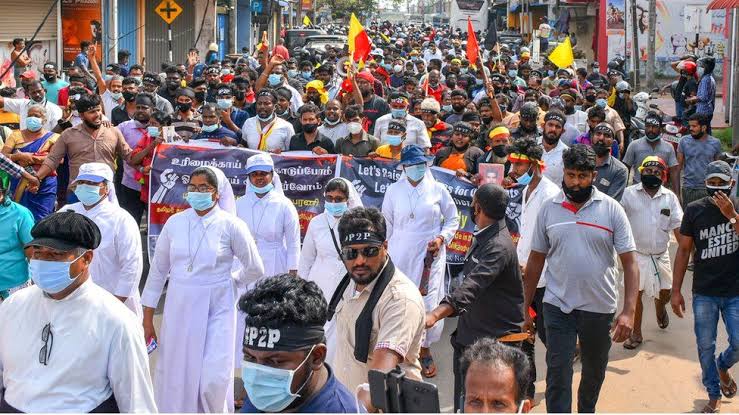Unilateral sanctions are human rights violations in the 21st Century: Sri Lankan scholar

By Jayanath Colombage
Sri Lanka is a case study of how unilateral sanctions inflict suffering on ordinary people, even when they are not directly targeted.
The world that we live in today has many challenges. The COVID-19 pandemic has been followed by a downturn throughout the whole world. If your economy is robust enough, you may sustain this situation. But it is not the case for many small-sized or medium-sized economies. They do feel the crunch and the punch of COVID-19 pandemic. Sri Lanka mobilizes foreign exchange reserves through primary commodity exports, tourism and remittances – and all three sectors are heavily impacted during the COVID pandemic.
The situation has been made even worse due to the Ukraine-Russia conflict and unilateral sanctions imposed by the West against Russia. Although not a part of the conflict in any way, and not near the conflict zone, Sri Lanka is suffering from the impact of Western sanctions against Russia which disrupted the global food supply chain. Major Western powers are not trying to resolve this conflict. We learned in conflict resolution and conflict transformation that we have to remove the materials that can catch fire. Instead, the major Western powers are adding fuel to the fire and are not trying to resolve this situation. This means the impact of it on the people of Ukraine, people of Russia, people of Sri Lanka is immense.
We need to look at this economic sanction from the angle of human suffering. The Russian special military operation in Ukraine and the consequences of unilateral economic sanctions have resulted in rising oil and gas prices and gas scarcity. Wheat prices are also going up. This has had a huge impact on a country like Sri Lanka.
When unilateral sanctions are used against a powerful country, there is no guarantee they will achieve their intended consequences. Why? Because that country will be robust enough and powerful enough to harden the stance, allowing it to survive, self-sustain up to a certain level, sustain production, industry, currency, gold reserves and other things. So, the economic sanctions do not really, as it has been claimed, show the intended result. Prior to the Russian-Ukraine conflict, the price of a barrel of oil was around $80, and now it went up to $120 per barrel. Who pays the difference between the prices before and after?
We are a small country with a small economy. And this has resulted in almost a collapse of our economy, bringing a huge impact and suffering on the people of Sri Lanka. It might be asked, what about their basic rights, due to these unilateral sanctions against Russia?
Let’s look at various cases where non UN sanctions have been imposed. When the US and the West impose unilateral sanctions, who is actually going to suffer? It is the ordinary people because of these unilateral sanctions. I have seen how people are trying to come out with their lives, I have seen how people want to do things and develop their economy and how kids want to restart their education. I have seen how young people are trying to learn life skills so that they can find suitable employment.
The world needs to study the consequence of sanctions because they constitute a serious violation of human rights. Therefore, in the UN system and in the international system, it needs to be asked, what actually are human rights? A new definition is needed. Has it been weaponized? Has it been heavily politicized? These questions must be asked. And also, human rights are used for bashing some countries. We have heard that when the world is united, we can have a better voice and we don’t like hegemonic powers.
Unfortunately, we do not hear that voice sufficiently. The big powers still win. Their narrative still prevails. This is why a new approach to human rights is needed, which involves defining it again in the 21st century to include unilateral sanctions as a violation of human rights. There is an urgent need to depoliticize and deweaponize human rights in this world.
In conclusion, there should be a long hard look given to unilateral sanctions and their consequences, not only on the targeted country, but also on the untargeted countries as well. The suffering of people because of these sanctions also needs to be mapped and shared with the world, if it is to become a better place to live.
In that sense, hegemonic ambitions, weaponizing and politicizing human rights, and imposing unilateral sanctions are really, really bad. And these are major violations of human rights of large number of ordinary people. The world has to look at this problem very seriously.




